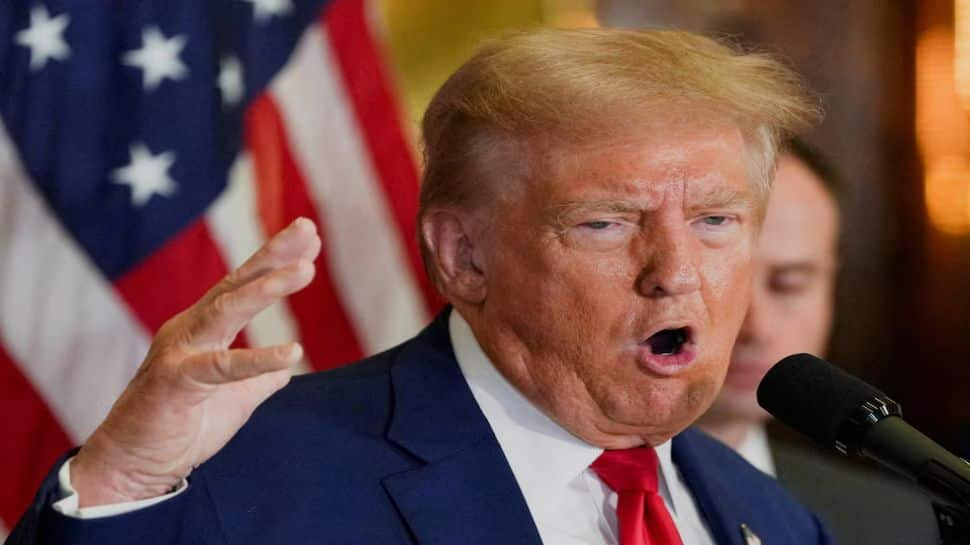Former US President Donald Trump has reignited his fiery rhetoric concerning the ongoing conflict in the Middle East, making bold claims that several Middle Eastern countries have expressed willingness to join a military campaign to dismantle Hamas in Gaza under his leadership. This statement comes at a time when a fragile ceasefire in the region is showing signs of strain and uncertainty.
In a post on his social media platform Truth Social, Trump declared that many of the "NOW GREAT ALLIES" in and around the Middle East have enthusiastically communicated their readiness to deploy heavy forces into Gaza if Hamas continues to violate agreements. Although he did not specify which countries had offered support, he singled out Indonesia, expressing gratitude towards its government and leader for their assistance to both the Middle East and the United States. Indonesia has previously indicated a willingness to contribute peacekeepers, but no nation has openly committed to engaging militarily against Hamas.
Trump portrayed the current spirit among these allies as unprecedented, stating, "The love and spirit for the Middle East has not been seen like this in a thousand years," describing it as "a beautiful thing to behold." He emphasized that although the opportunity for military action exists, a decision to move forward has not yet been made, stating, "NOT YET!" He retained hope that Hamas would comply with expectations and "do what is right." However, his tone shifted dramatically as he warned that if Hamas persisted in defiance, "an end to Hamas will be FAST, FURIOUS, & BRUTAL!"
The backdrop to Trump's assertive statements is the highly volatile situation following the ceasefire that began on October 10. Despite the truce, violence has continued, with Israel reportedly killing nearly 100 Palestinians since the ceasefire’s inception. This raises questions about the durability and effectiveness of the ceasefire that Trump’s team helped broker. From the outset, Israel has engaged Palestinians near designated military zones—many of which remain undefined or unmarked—leading to ongoing casualties and tension.
Humanitarian aid, a critical component of the ceasefire agreement, has been severely limited. Gaza’s Government Media Office reports that since the ceasefire, only 986 aid trucks have been permitted into Gaza, far below the 6,600 trucks promised or the targeted 600 trucks per day. The situation deteriorated further after airstrikes on a recent Sunday killed numerous Palestinians, prompting Israel to halt all aid deliveries following the deaths of two Israeli soldiers in Rafah. Israel blamed Hamas for the incident, but Hamas denied responsibility, claiming the blast occurred on Israeli soil. Subsequent US media reports suggested the soldiers might have accidentally detonated an unexploded shell.
As the ceasefire falters, the larger issue of governance and security in Gaza remains unresolved. Trump insists that Hamas must disarm, linking the group's disarmament to the future stability of the region. However, Hamas has conditioned its disarmament on the recognition of Palestinian statehood. When asked about a timeline for disarmament during a Fox News interview, Trump acknowledged there was "no hard timeline." US Vice President JD Vance, speaking from Israel, echoed the complexity of the situation, emphasizing that establishing a new "security infrastructure" would be a prerequisite to any disarmament.
Despite the challenges, Vice President Vance attempted to project optimism. Standing in Israel, he told reporters, "We are doing very well. We are in a very good place. We are going to have to keep working on it, but I think we have the team to do exactly that." Acknowledging the difficulties ahead, Vance admitted that disarming Hamas would not happen quickly and highlighted the ongoing efforts to locate Israeli hostages held in Gaza. He revealed that some hostages remain buried under rubble, while the whereabouts of others are unknown. Currently, 15 Israelis are still missing in Gaza, and thousands of Palestinians are unaccounted for, presumed dead beneath the destruction caused by ongoing conflict.
Adding to the complexity of the situation are disturbing reports from Gaza’s health officials, who claim that Israel has returned 135 bodies of Palestinians displaying signs of torture and execution, underscoring the brutal nature of the conflict’s human toll.
In a significant development, the US announced the establishment of a new command post in Israel called the Civilian Military Co-operation Centre (CMCC). Announced by Vice President Vance, this US-led hub is designed to coordinate the reconstruction of Gaza following the conflict. Commander Brad Cooper of the US Central Command in the Middle East disclosed that

